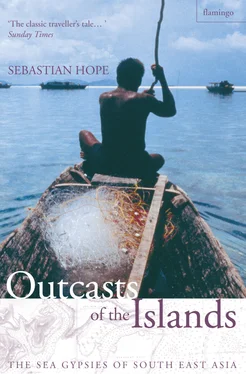1 ...8 9 10 12 13 14 ...18 The Bajau Laut cannot compete against these fishing methods. Sarani blamed them for the declining ray population, but the Bajau Laut themselves seemed the most likely culprits in that case. The Mabul fleet could not lay ten nets, say, catching forty ray daily for ten years and not have had an effect on the size of the stock. I had been watching the last gasps of a ray on our way back to Kapalai. It was on its back. Shivering sighs passed through its body. Its gulps for water became less frequent. Finally the muscles of its belly went slack, and a rush of fluid came from its cloaca, followed by a tiny, completely formed pup, its wings rolled over under its stomach like the curled-up sides of a tongue. It was alive, born mimicking its parent’s weakening death throes. I flicked it over the side; they are also born with a sting. Being viviparous makes the ray population extremely sensitive to the loss of mature adults.
We poled out to the edge of the reef and anchored so that we would not be caught by the falling tide when we wanted to leave Kapalai. We were joined by two other boats, Pilar’s and that belonging to Merikita. He had married Pilar’s elder sister, Timaraisa, and had become part of Sarani’s group. They had two sons and a daughter a little older than Arjan. Their boat was neat and painted in the same colours as the rest of the fleet, light blue and white and red-brown, no bigger than Sarani’s but roofed like Pilar’s. The roof showed that their recent outings had been more successful than ours. They had more than twenty fresh ray hung out on poles and twice that many already dried, tied into bunches. Timaraisa sat in the stern shelling a string bag full of clams with a parang. She scooped out the flesh into a bowl and then strung them up to dry. Merikita had already set off in his canoe to catch lunch. He had a stocky and powerful physique and a round face. He was shy and softly spoken. Sarani always referred to him as ‘Merikita, the fat one’, never just ‘Merikita’, but in a matter-of-fact way, without judgement, and often it was ‘Merikita, the fat one, rajin sekali , dia , he’s very hard-working. His children are not hungry.’ I never heard him pay a higher compliment. We weighed anchor in the afternoon, headed for Mabul where we would spend the night before moving on to Semporna in the morning.
There were more boats strung out over the shallows south of Mabul than there had been at Kapalai, and word went round that we were bound for Semporna. Canoes started to arrive and produce was loaded onto Pilar’s boat, ready for an early start. We would use his boat; not only was its engine more powerful, but also because it would no longer be afloat if left all day with no one to pump out the bilge. Timaraisa arrived with dried ray and clams on strings like bunches of keys. I sat with Sarani, making out a shopping list. We had not talked again about money since the first day when he suggested I pay him for a five-day tour of the islands. He knew more about me now, and it seemed, mercifully, he had forgotten his plan. I hoped that I had shown him that I wanted to help where I could, to join in their life. I would help with supplies if necessary, but the old aid-workers’ adage seemed particularly appropriate: ‘Give a person a fish, and you feed them for a day; give them a net and they can feed themselves for life.’ Over-simple, maybe – there have to be fish to catch in the first place – but, as Pilar took Sarani’s hurricane lamp to pieces and named the parts that needed replacing (Sarani was not so good with technology), I wrote them down on my list, happy in the knowledge that for a few ringgit I could double Sarani’s fishing opportunities on the reef. Fish-spear tips went onto the list. I added condoms. And delousing shampoo. And, Jayari reminded me when we went to visit, ‘if you pity me’, cough syrup. It was dark when we left his house. I had watched him sitting at the seaward door, smoking a Fate as the sun set, as I had when I had first landed on Mabul.
We weighed anchor in the first light, the sun just edging over the horizon as we passed the last stilt houses, and ran straight across the Creach Reef on the highest of the tide. Looking back at the island I little expected that this view would change overnight.
All the traffic of the coast was funnelled into the Semporna Channel, the port’s only approach from the south. Jongkong and pump-boats were putting out from the jetties of Bum Bum, from the creeks and estuaries of the mainland, filled with people bound for the market. We overhauled a commercial fishing boat, idling home along the coast from Tawau waters after a night netting squid by arc light. The crew were sorting the catch on the afterdeck. We left dug-outs bobbing in our wake, old men solemnly jigging handlines at the edge of the reef.
We made the last dog-leg into Semporna roads, the scattered villages on the mainland shore coalescing into the stilted suburbs south of the town. A jongkong from Bum Bum passed close by, a mixture of ages and sexes, all freshly scrubbed and ready for the mainland. The children were in school uniforms, red and white or blue and white depending on their grade. The men and women were smartly dressed too, the women in brightly patterned dresses, many of the men wearing the traditional Malay songkok velvet hat and the name badges of clerks and officials on fresh short-sleeved shirts. The Bajau Laut have their own caches of clean clothes. Above his dark shorts Sarani had put on a gingham shirt in the red-browns and pale yellows of Ralph Lauren’s Western palette. He looked very fetching; only the tear at the shoulder and his long white stubble let him down. I put razors on my list. The women looked comely in clean blouses and tight sarongs. Sumping Lasa wore a lacy dress and her hair in bunches. She was taking her flip-flops for a test drive, running to and fro through the cabin. There was very little clearance between her head and the roof beams; I did not want to be near when she grew that last millimetre. Arjan had been persuaded to wear his one shirt, grubby beyond measure, pseudo-Tom and Jerry characters in pink and yellow chasing across his back, the front held together, sometimes, with a safety-pin.
We passed the fish quay where the trawlers were unloading, the ramshackle drinks stalls and ice houses at the end of the mole, and on into the mêlée of craft milling around the margins of the water market, jongkong nipping in and out, disgorging their passengers, taking on cargo, pump-boats puttering around in between. We came in slowly, shouldering our way to a place at the mooring, and trading for our catch had started before the engine had been cut. A pump-boat from Bum Bum with a family aboard came up astern, and the matron in its bows started to bargain for fresh clams. We docked and before we had tied up, there was a man on the bow deck, picking over the shark-fin. Another shouted down, did we have any kahanga , and who’s the whitey? He climbed aboard to examine both. The women seemed to be in charge of selling the produce, so Sarani and I went to a café. We stepped up onto the walkway and were swallowed by the crowd.
The water village, the kampung air , is a particularly Malay phenomenon. Most coastal towns have one, in fact most coastal towns began life as a kampung air , a hamlet on stilts over tidal flats. It is a practical way for a coastal people to live. Your doorstep is the jetty to which you can tie up and from which you can launch whatever the state of the tide. Your house catches even the lightest sea breeze and living beyond the beach you are untroubled by the mosquitoes of the coast and the diseases they carry. You are ideally positioned should danger threaten from the land to escape to the sea, and vice versa. On land, the mosque nestles at the edge of the coconut groves; behind the palm belt are the well and the gardens. Sanitation and waste disposal are left to the care of the sea and its creatures. The system works just as well on rivers and in estuaries. Such is the Malay idyll, a life of simplicity, sufficiency and virtue, and such is its continuing power in the Malay imagination that ‘to go back to the kampung ’ is a rustication much wished for by urban types. To be ‘just a kampung boy’ is certainly no barrier to high political office. Dr. Mahathir, the Prime Minister of Malaysia, was a kampung boy.
Читать дальше












